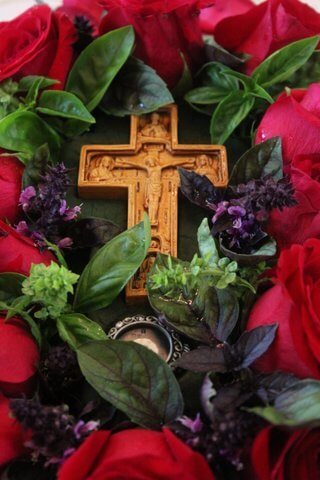If you make it to the Liturgy for the Exaltation of the Cross, the cross will likely be set out on a fragrant bed of fresh basil. Why is that?
The first thing you have to understand is that when we Orthodox ask a question like that, the answer tends to be a story. And we love stories. So when we start explaining why we do what we do, we come up with lots of stories. (Just think of red eggs at Pascha!)
St. Helena and the Mound of Basil
One of the stories that we tell at the Exaltation of the Cross goes back to the time that the Empress Helena found the Cross. As you’ll remember, she was in Jerusalem, hoping to find the Cross on which Christ died. Jerusalem even then was too large, too full of people and streets and buildings just to dig up the entire city. But as the Empress Helena wandered through the city, she noticed a mound or little hill covered with a fragrant herb she wasn’t familiar with.
Someone local, it seems, told her the name of the herb. A kingly herb. Fragrant, like incense or myrrh. Could this be a sign?
So the Empress Helena instructed her servants to dig where the herb grew. And there, beneath the basil, she found the True Cross. And so, in remembrance of that, we place the cross on a mound of basil.
Filling the Church with Basil
Some people plant basil in their gardens every year, not just for their own use but to ensure that their parish has basil aplenty for the Feast of the Exaltation of the Cross. Some parishes fill their church on the feast day with bushels of basil. Sprigs and swags of basil adorn the icons. Vases of basil fill every niche and windowsill. Men pin bunches of basil to their lapels. Women wear it pinned to their dress or tucked in their hair.
At the end of the service, everyone comes forward to venerate the cross and receive basil from the priest. And sometimes, young people who are not yet married take a sprig of basil home with them after church. They put it under their pillow at night, so that they will dream of the person they will someday marry.
Troparion for the Exaltation of the Cross
O Lord, save Your people and bless Your inheritance;
grant victory to the faithful over their adversaries.
And protect Your commonwealth, by the power of Your Cross.
Read More
The True Cross: Thoughts on the story of St. Helena and the finding of the true cross.
St. Helena and the Cats of Cyprus: When St. Helena stopped by Cyprus, she found the island infested with snakes. So she imported cats. Their descendants are still there!
St. Placilla the Empress: St. Placilla’s feast day is September 14, the same day as the Exaltation of the Cross. That means she gets forgotten, but she’s well worth remembering.
Buy the Books!

These delightfully diverse books provide disability representation (Elizabeth, one of the main characters, is an ambulatory wheelchair user). They also give Orthodox Christian children the rare opportunity to see themselves in books, and children who are not Orthodox the chance to see cultural practices they may not be familiar with.
Catherine’s Pascha
FINALIST IN THE 2015 USA BEST BOOK AWARDS
Catherine doesn’t like vegetables. She doesn’t like naps. She doesn’t like it when her mom combs her hair. She loves hot dogs, chocolate cake, and her best friend, Elizabeth. Most of all, she loves Pascha! Pascha, the Orthodox Christian Easter, is celebrated in the middle of the night, with processions and candles and bells and singing. And Catherine insists that she’s not a bit sleepy.
Celebrate the joy of Pascha through the magic of a book: Catherine’s Pascha. Available on Amazon, Bookshop.org, and my webstore.
The Saint Nicholas Day Snow
Shoes or stockings? Horse or sleigh? Does St. Nicholas visit on December 6 or on Christmas Eve? Will a little girl’s prayer be answered? When Elizabeth has to stay at Catherine’s house, she’s worried about her grandmother, and worried that St. Nicholas won’t find her. The grownups, though, are worried about snow.
Celebrate the wonder of St. Nicholas Day through the magic of a book: The Saint Nicholas Day Snow. Available on Amazon, Bookshop.org, or my webstore.



